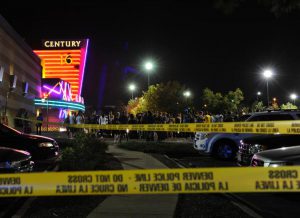Cinemark Wins Lawsuit, Demands Shooting Victims Pay $700,000 for Litigation Costs
Cinemark just won a legal battle with the victims of the 2012 mass shooting that occurred outside a Century 16 movie theater in Aurora, Colorado. Cinemark is also asking for a good chunk of change to pay off their legal fees. Seems harsh to ask the victims of a mass shooting to pay your legal fees, but Colorado law allows a winning party to recover reasonable litigation costs.
After the murder of 12 and the injury of 70, Cinemark was sued by several victims of the attack; the plaintiffs alleged that because Cinemark had a lack of security, such as armed guards and gaps in security camera coverage, they helped enable the attack. Last month, a jury sided with Cinemark and found the company wasn’t liable for the shooting. Now, Cinemark has turned in a bill nearing $700,000 requesting the Court to order the victims to pay up.
In another similar case recently won by Cinemark in a federal court, a judge awarded the company “reasonable costs”; Cinemark has yet to turn in a bill for that case so it’s hard telling how high that one will be. What will this mean for the victims? Will they be required to pay?
Sounds Extreme, Huh? Well, It’s Not a New Concept
It’s not necessarily a new concept that the losing party be asked to pay litigation fees. Traditionally, here in the U.S., parties are required to pay their own fees so that individuals can pursue litigation without fear that costs will be excessive, but there’s obviously exceptions. Most states that have these types of laws were enacted for the purpose of encouraging parties to settle their own lawsuits and, thus, keep the court dockets unclogged. 
This can be especially true in states, like Colorado, that have more specific statutes that state the losing party will pay litigation costs if they lost the case and refused a significant settlement amount prior to trial. More than half of the victims in the federal case against Cinemark settled prior to trial; no doubt that some of them factored into their decision the possibility of having to pay Cinemark’s litigation fees if they lost. For those that didn’t, it’s probably a risk they weighed with their attorneys.
Since Colorado allows prevailing parties to recover some of its costs expended in order to go to trial, it’s important to note the distinction between costs of litigation and attorney’s fees because they are two entirely different things.
Costs of litigation are out-of-pocket expenses; though not an inclusive list, these can include anything from costs of expert witnesses, transcript and deposition fees, travel and photocopying costs, and trial-exhibit preparation costs. These are submitted to the court as a “bill of costs,” which is precisely what Cinemark did.
Attorney fees are what the attorney earned for working on the case and are generally not recoverable unless the lawsuit is found to be frivolous and groundless, which is actually pretty rare. In either case, judges have considerable discretion when determining which categories of costs to award, as well as the amount.
Awards Must Be Reasonable and Judges Have Discretion
What happens when a losing party is unable to pay? Unfortunately, if the plaintiffs are ordered to pay, Cinemark can use any legal means available to recover the money, even if the company knows the plaintiffs don’t have the money. The victims of the Aurora shooting could try negotiating a settlement with Cinemark.
In exchange for releasing the victims from any amount the Court orders them to pay, the victims could agree not to appeal the decision to a higher court. This can sometimes just be used as a scare tactic, though. According to The Wall Street Journal, attorney for the plaintiffs, Marc J. Bern, said the $700,000 bill “is an outrageous attempt to keep the plaintiffs from appealing” and said he plans to file an objection with the court.
Luckily, there’s still a sliver of hope for the Aurora victims. When determining what and how much of a party’s costs can be recovered, Colorado case law says that the judges should examine the overall context of the case and where the parties spent the majority of their time and resources. The presiding judge on the case still has to approve any amount awarded to the company and it’s possible the judge might find the whopping $700,000 bill unreasonable.

Comments